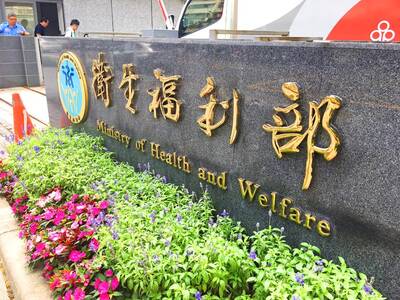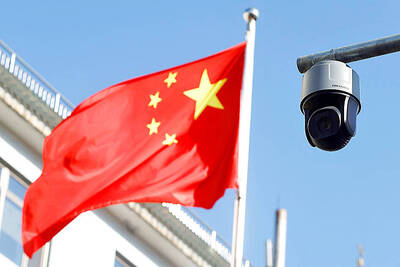A new US military study concluded that the massive missile force China has aimed at Taiwan is being constantly enhanced and improved.
While the actual number of missiles may not have increased much over the past few years — there are believed to be about 1,600 in total — China is introducing newer missiles with better range, accuracy and warheads.
“It [China] has fielded a large, diverse array of increasingly capable short range ballistic missiles, particularly within range of Taiwan,” the report by US Naval War College associate professor Andrew Erickson and senior RAND Corp political scientist Michael Chase said.
Published in this month’s National Interest, the report argues that China’s efforts to undermine Japan’s administrative control over the disputed Diaoyutai Islands (釣魚台列嶼), which Japan calls the Senkaku Islands and Taiwan also claims, are raising the possibility of a crisis that could draw in the US by challenging the credibility of the US’ extended deterrence.
“To deter negative Chinese actions in this vital but volatile region while avoiding dangerous escalation, Washington must better understand the ultimate instrument of Chinese deterrence: the People’s Liberation Army Second Artillery Force [PLASAF], which controls the country’s land-based nuclear and conventional ballistic missiles and its ... land-attack cruise missiles,” the report said.
Possessing the world’s second-largest economy and a growing defense budget has enabled China to deploy more formidable military capabilities, Erickson and Chase said.
They said that Beijing wants to wield these capabilities to increase its leverage in disputes regarding island and maritime intervention “in the event of a conflict with one of its neighbors.”
The PLASAF’s ballistic missile development program has produced longer-range, more accurate, improved-payload missiles to upgrade its existing arsenal.
“China’s missile force has deployed a variety of systems, including short-range ballistic missiles opposite Taiwan, mobile conventionally armed medium-range ballistic missiles for regional deterrence and conventional-strike operations, and new mobile, nuclear-armed ICBMs for strategic deterrence,” the report said.
The report said that to increase its influence over disputed territorial and maritime claims around its contested periphery in peacetime and, if necessary, through wartime operations, China has developed and deployed the world’s foremost force of theater ballistic missiles.
At the theater level, China’s missile force is capable of supporting a variety of types of campaigns against Taiwan, the report said.
The report cites a US Department of Defense finding that China probably could not now enforce a full military blockade, particularly if a major naval power intervened, but its ability to do so would “improve significantly” within 10 years.

MEDICAL: The bills would also upgrade the status of the Ethical Guidelines Governing the Research of Human Embryos and Embryonic Stem Cell Research to law The Executive Yuan yesterday approved two bills to govern regenerative medicine that aim to boost development of the field. Taiwan would reach an important milestone in regenerative medicine development with passage of the regenerative medicine act and the regenerative medicine preparations ordinance, which would allow studies to proceed and treatments to be developed, Deputy Minister of Health and Welfare Victor Wang (王必勝) told reporters at a news conference after a Cabinet meeting. Regenerative treatments have been used for several conditions, including cancer — by regenerating blood cells — and restoring joint function in soft tissue, Wang said. The draft legislation requires regenerative treatments

POLICE INVESTIGATING: A man said he quit his job as a nurse at Taipei Tzu Chi Hospital as he had been ‘disgusted’ by the behavior of his colleagues A man yesterday morning wrote online that he had witnessed nurses taking photographs and touching anesthetized patients inappropriately in Taipei Tzu Chi Hospital’s operating theaters. The man surnamed Huang (黃) wrote on the Professional Technology Temple bulletin board that during his six-month stint as a nurse at the hospital, he had seen nurses taking pictures of patients, including of their private parts, after they were anesthetized. Some nurses had also touched patients inappropriately and children were among those photographed, he said. Huang said this “disgusted” him “so much” that “he felt the need to reveal these unethical acts in the operating theater

Taiwanese should be mindful when visiting China, as Beijing in July is likely to tighten the implementation of policies on national security following the introduction of two regulations, a researcher said on Saturday. China on Friday unveiled the regulations governing the law enforcement and judicial activities of national security agencies. They would help crack down on “illegal” and “criminal” activities that Beijing considers to be endangering national security, according to reports by China’s state media. The definition of what constitutes a national security threat in China is vague, Taiwan Thinktank researcher Wu Se-chih (吳瑟致) said. The two procedural regulations are to provide Chinese

WARFARE: The PLA aims to use space-based capabilities to enhance its force projection to make the Indo-Pacific region too costly for the US to protect, experts said China is rapidly building space capabilities to be able to launch precision strikes on Taiwan, the US and its allies, US Space Force leaders said at a recent conference in London. China is developing counterspace warfare capabilities including GPS jamming systems and anti-satellite missiles at “breathtaking speed,” said General Stephen Whiting, commander of the US Space Command. In the past six years, Beijing tripled its number of dedicated intelligence, surveillance and reconnaissance satellites, while rapidly fielding dual-use satellites, Whiting said, adding that the capabilities are honed for detecting movements at sea. The Chinese People’s Liberation Army (PLA) might have already achieved substantial benefits